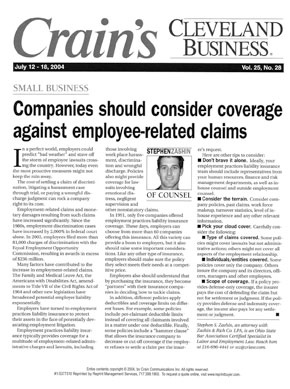
Z&R Press
Press and Media
Law360
NFL Union Report Card Ruling Avoids Tackling Speech Rights
February 23, 2026
Law360
Mocktails Seen As Key Ingredient For Holiday Party Inclusivity
November 8, 2023
Cleveland Metropolitan Bar Journal
Women in Law
April 2020
Smart Business Cleveland
2017 Smart Business Family Business Achievement Awards
September 2017
Crain's Cleveland Business
Ohio Employers Confront Marijuana Use
July 22, 2017
Sports Illustrated
Lane Johnson's Bold Move To Sue His Own Union Is Rare, But Not Unprecedented
January 11, 2017
Law360
Packers Player Drops NFL Drug Suspension Dispute
December 19, 2016
Sports Business Daily
NFL, NFLPA Appoint Das As Third Arbitrator In Michael Pennel Lawsuit
December 5, 2016
Sports Business Journal
Eagles Lineman Challenges NFL and NFLPA in NLRB Filings
December 5, 2016
Law360
Eagles Lineman Says Suspension Violates Federal Labor Law
November 29, 2016
The Business of Sports with Andrew Brandt
RTAB #30: Lane Johnson's Legal Team (Audio Interview)
November 29, 2016
BNA's Health Law Reporter
Surprise! The NLRB Says You Just Might Be a 'Joint Employer'
September 24, 2015
BNA's Health Law Reporter
NLRB Adopts New Joint Employer Standard; Ruling Could Affect Health-Care Industry
September 3, 2015
BNA's Health Law Reporter
Challenge to NLRB Election Rule Fails; Employers Urged to Prepare New Game Plan
June 11, 2015
American Bar Association Section of Labor and Employment Law
Member Spotlight: George S. Crisci
April 13, 2015
Crain's - Article and Video
Zashin & Rich embraces Cleveland roots and rock 'n' roll heritage
November 16, 2014
BNA's Health Law Reporter
Justices Reject NLRB Recess Appointments; Significant Health Care Decisions in Limbo
July 10, 2014
BNA's Health Law Reporter
The EEOC and FTC Turn Up the Heat on Employer Background Checks
April 2014
Crain’s
Zashin & Rich move marks big milestone
for E&Y Tower
November 2013
Cleveland.com
Zashin & Rich law firm leases last full floor of Ernst & Young Tower at Flats East Bank project
November 2013
CCH Employment Law Daily
NLRB NEWS - Controversy Erupts Over NLRB Recess Appointments
January 2012
Crain’s
Companies should consider coverage against employee-related claims
By Stephen Zashin | July 2004
Crain’s
ADR programs can save dollars and time
By Stephen Zashin | November 2003
COSE Update: Legal Ease
One Size Does Not Fit All
(Employment Practices Liability Insurance)
By Stephen Zashin
COSE Update: Legal Ease
Noncompete Agreements
By Michele Jakubs
COSE Update: Legal Ease
Ohio's 'Baby COBRA' Law
By Helena Oroz
Crain's
Small Business
“Companies should consider coverage against employee-related claims”
July 12-18, 2004 | By Stephen Zashin | Download PDF of Article

In a perfect world, employers could predict "bad whether" and stave off the storm of employee lawsuit crossing the country. However, today even the most proactive measures might not keep the rain away.
The cost of settling a claim of discrimination, litigating a harassment case through trial, or paying a wrongful discharge judgment can rock a company right to its core.
Employment-related claims and monetary damages resulting from such claims have increased significantly. Since the 1980s, employment discrimination cases have increased by 2,000% in the federal court alone. In 2003, employees filed more than 81,000 charges of discrimination with the Equal Employment Opportunity Commission, resulting in awards in excess of $236 million.
Many factors have contributed to the increase in employment-related claims. The Family and Medical Leave act, the Americans with Disability Act, amendments to the title VII of the Civil Rights Act of 1964 and other new legislation have broadened potential employer liability exponentially.
Employers have turned to employment practices liability insurance to protect their assets in the face of potentially devastating employment litigation.
Employment practices liability insurance typically provides coverage for a multitude of employment-related administrative charges and lawsuits, including those involving work place harassment, discrimination and wrongful discharge. Policies also might provide coverage for lawsuits involving emotional distress, negligent supervision and other nonstatutory claims.
In 1991, only five companies offered employment practices liability insurance coverage. These days, employers can choose from more than 60 companies offering this insurance. All this variety can provide a boon to lawyers, but it also should raise some important considerations. Like any other type of insurance, employers should make sure the policy they select meets their needs at a competitive price.
Employers should also understand that by purchasing the insurance, they become "partners" with their insurance companies in deciding how to tackle claims.
In addition, different policies apply deductibles and coverage limits on different bases. For example, some policies include per-claimant deductible limits instead of covering all claimants involved in a matter under one deductible. Finally, some policies include a "hammer clause" that allows the insurance company to decrease or cut off coverage if the employer refuses to settle a claim per the insurer's request.
Here are other tips to consider:
- Don't brave it alone. Ideally, your employment practices liability insurance team should include representatives from your human resources, finances and risk management departments, as well as in-house counsel and outside employment counsel.
- Consider the Terrain. Consider company policies, past claims, work force make-up, turn-over statistics, level of in-house experience and any other relevant information.
- Pick your cloud cover. Carefully consider the following:
- Type of claims covered. Some policies might cover lawsuits but not administrative actions; others might not cover all aspects of the employment relationship.
- Individuals / entities covered. Some policies cover only the company. Others insure the company and its directors, officers, managers and other employees.
- Scope of coverage. If a policy provides defense-only coverage, the insurer pays the cost of defending the claim but not for settlement or judgment. If the policy provides defense and indemnity coverage, the insurer also pays for any settlement or judgment.
Stephen S. Zashin, an attorney with Zashin & Rich Co. LPA, is an Ohio State Bar Association Certified Specialist in Labor and Employment Law. Reach him at 216-696-4441 or ssz@zrlaw.com.
